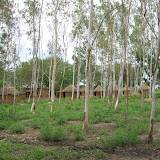
Feet on the ground, head in the sky…
I came back to village after almost two months of America, the steel and bottled water still swimming in my stomach. My hut, of course, was a mess – bits of my new straw roof was strewn across my bed and floor; the termites had eaten out my bookshelf and some of the books with it. But how good it is to be home! I came back, not as a guest, a burden, a novelty, but as just another villager, missed but not paraded.
The first night I got back, I walked to see Soliba and caught her on the path. She said she was going to the health center, where her friend was giving birth. I joined, and as we came we found little Tene’ba, the tiny older midwife, happy to see me as she sat outside. Soliba went inside; Tene’ba told me about her friend’s baby, how it had died during the birth. The young mother lay curled under a piece of fabric; Soliba and her sisters sat quietly. I went in to see the baby, a plump thing, but gray and of course silent. Tene’ba spit on the baby and folded it into a clay pot. It fit so neatly into the little pot, all the sudden out of its tiny existence. We walked to the treed area next to the health center where they are buried. Two of the mother’s friends joined us with a daba, a type of shovel. Tene’ba broke the soil, as she did she let out a cry, intensely violent and controlled, a sad anger. I thought, at least someone is angry. After the pot was in the mound she spit on the ground, three times, the animist warning off of evil spirits. We walked back to the health center and washed the dirt off our feet.

A few days later my host mother Hagi invited me to join the women from the Women’s Association, who were farming at the peanut fields to raise money for our garden project. We went out early, the first ones there beside the little drummer man we met on the way, who told us he was drumming to call in the women to work. They came in with dabas and their littlest babies, maybe twenty in all. The man beat his drum the whole day, keeping a persistent beat that the women worked to. The Griot, a sort of town songstress, came and sang with the women in her faded yellow lace outfit, and the women would sing in response as they bent over their rows of peanuts. They worked in groups of 5 or 10, all of them in a line, progressing in time with the other women as they cleared the weeds from the new peanut plants. They insisted I sit in the shade and watch the babies, but every once in awhile I would come and relieve some of the women who looked tired. We would stop sometimes to dance; someone would throw a scarf to the next women, whose turn it was to dance to our claps and the drums. We worked until late afternoon, the women working bent throughout the day. Making food for their children, working together, what more could we have to celebrate? And I thought, this anger I've seen, this joy I feel is as human as technology is not. Without the computers, the gadgets and cell phones and nothing but our hands in the ground, we find that all we have is each other. I like that.

No comments:
Post a Comment